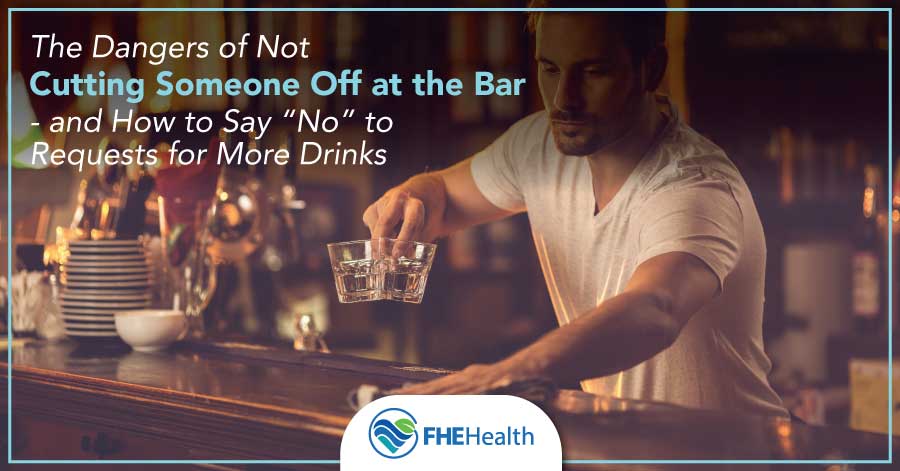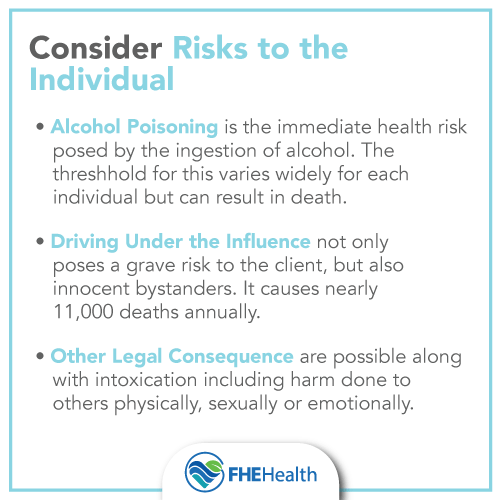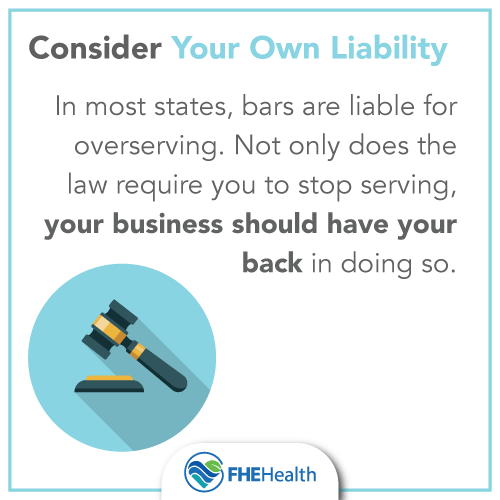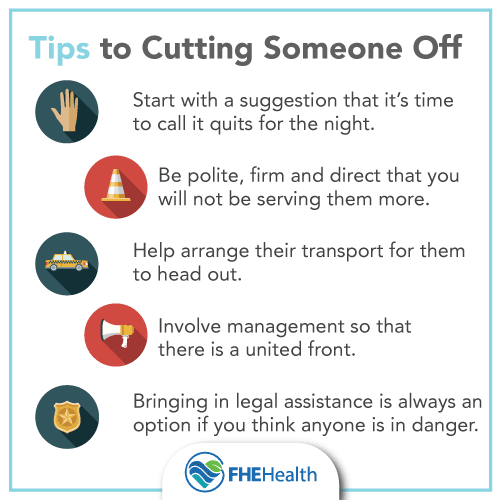
For many people in the service industry, tending bar is a dream job. It’s often easier physically than waiting tables, yields plenty of face time with happy patrons and offers the promise of big tips. However, like any job, bartending has its downsides, and that includes facing patrons too drunk to continue drinking.
No bartender likes making the choice to cut off a patron. It’s incredibly awkward to tell someone under the influence that it’s time to call it a night, particularly when the tab is getting big and the party is still going.
Even normally polite and well-mannered individuals can become belligerent and aggressive when intoxicated, threatening a dramatic situation in response to a simple request. Further, cutting someone off can directly influence income; a drunk individual you have to cut off may not give you a good tip out of spite.
Despite the stress of telling someone enough is enough can, cutting someone off when they’ve had too much isn’t so much a choice as it is an obligation. This is what you put on the line when you let someone visibly intoxicated continue to drink.
Risks to the Individual
Many people are able to drink recreationally without the risk of danger. However, some people take things too far, particularly when an alcohol use disorder is involved. Stopping this train in its tracks is often easier said than done, but failing to do so can facilitate several dangerous situations.
Alcohol Poisoning

Alcohol poisoning is a serious condition that can occur when alcohol is consumed at high levels. While treatable when caught in time, alcohol poisoning can be fatal.
Alcohol is a central nervous system depressant. This means that at high levels of consumption, alcohol can interfere with the functioning of the CNS, leading to serious consequences, including difficulty breathing, a reduction in heart rate, lower body temperature and a suppressed gag reflex.
When combined, these symptoms can result in coma or death. In the United States, approximately six people die each day from alcohol poisoning.
Due to the ways in which alcohol affects the body, it is possible to drink faster than your body can process. For this reason, people drinking heavily can go from functional to blacked out very rapidly.
In addition, alcohol tolerance can vary wildly. A small woman who doesn’t drink often may reach a dangerous blood alcohol content after five drinks while a larger man who drinks often may require 15 drinks to reach this level. It’s not always easy to see when someone is at risk of alcohol poisoning, so making the choice to cut someone off often means being safe now to avoid being sorry later.
Driving Under the Influence
Every year, thousands of people get behind the wheel while intoxicated. In the moment, driving drunk may seem like the best option, particularly for those who drove to the bar, but drunk driving is never the right choice.
Depending on the state, DUIs, also known as DWIs or OVIs in some jurisdictions, can result in severe penalties, including a suspended license, steep fines, time in court, attorney fees and time in jail. This can accelerate for multiple occurrences; in some states, more than one DUI can lead to thousands in fines and time served in state prison.
Drunk driving affects more than the potential for legal consequences. Driving drunk is never safe; drunk drivers are distracted, unable to concentrate, have trouble staying in their lanes and may not notice other cars.
Unfortunately, driving drunk is the cause of nearly 11,000 road deaths annually, ruining countless lives in a split second. A death caused by drunk driving may result in a manslaughter charge and years in prison.
Other Legal Consequences
The legal consequences of driving drunk are well known, but that’s not the only way an intoxicated individual can get in trouble with the law. Intoxication can significantly affect reasoning skills and judgment, leading to incidents that likely wouldn’t happen under normal, sober circumstances.
Those who are heavily intoxicated are more like to take risks, including physical challenges, and may be more easily provoked, leading to fights, theft, violence or even something mundane but illegal like being excessively intoxicated in public.
Liability Concerns and Company Policy
 In general, most companies are very concerned with protecting themselves from liability, and this includes consequences from inebriated clients. Bars and restaurants that knowingly serve patrons who have had too much to drink aren’t blameless in whatever problems arise later, and that includes both legally and morally.
In general, most companies are very concerned with protecting themselves from liability, and this includes consequences from inebriated clients. Bars and restaurants that knowingly serve patrons who have had too much to drink aren’t blameless in whatever problems arise later, and that includes both legally and morally.
In 38 states, Dram Shop laws relate to serving those who are intoxicated or appear intoxicated. If a bar continues to serve a patron, and that patron gets in their car and causes an accident, the bar shares the liability.
As such, cutting off drunk customers isn’t just a good idea; it’s the law. As a bartender or restaurant owner, understanding the laws in your state or city is essential.
How to Cut Someone Off
 So, there’s a drunk guest at your bar and you need to handle the situation. Here’s what you should do to prevent unnecessary damages or liability.
So, there’s a drunk guest at your bar and you need to handle the situation. Here’s what you should do to prevent unnecessary damages or liability.
Start With a Suggestion
Instead of ordering a guest to leave, start with a suggestion. Say something like, “I know you’re having a good time, but how about calling it quits for tonight?” This kind of phrasing is light and polite and makes it seem like the choice to stop drinking is the patron’s, not yours.
Some intoxicated people are belligerent and in denial, but others are still aware of their condition. For those who seem hesitant, you may also have success in reasoning with a customer’s friends, particularly if they appear to have had less to drink.
Be Polite But Firm
For guests who do not want to make their own choice to stop drinking, it’s time for you to play the role of the enforcer. Be direct and let the customer know that you cannot continue serving them.
If you would like to shift the blame away from yourself, it’s okay to point the finger at restaurant policy or state law. Regardless, a customer who is pushy about another drink shouldn’t sway you.
Arrange a Ride Home
In many areas, public transportation is lacking and customers are forced to drive to bars and restaurants. As such, it’s very likely that patrons who are cut off will drive home.
Calling a cab or arranging for a ride-share can placate angry customers and prevent them from making poor decisions as a result of their intoxication. It also softens the blow of being asked to leave and implies that your business cares about its customers.
Involve Management
If you are facing a belligerent drunk who appears to be ready to cause a problem, involving your manager is a good idea. Your manager can take the onus from you, back up your decision and guide a patron out of the bar, particularly as most bartenders are required to stay behind the bar. If you are the manager, enlisting the help of another server can also be beneficial.
Bring in Legal Assistance
Calling the police should be the last step you take, but if a guest is truly aggressive, angry or prepared to fight, it may be necessary. It’s generally not suggested for bartenders or servers to physically engage with intoxicated customers, but the police can do this, restraining or even arresting patrons who cannot handle being cut off. Again, this should be a last resort, but in some cases, it may be the only option left.
Working in the service industry can be fun and full of challenges, but not all aspects of the job are enjoyable. As a professional who provides others with drinks and food, it’s up to you to make sure that everyone’s good time is safe and responsible. By cutting someone off when they’ve had enough, you’re doing your part to manage problematic drinking habits and protect your company from liability.






